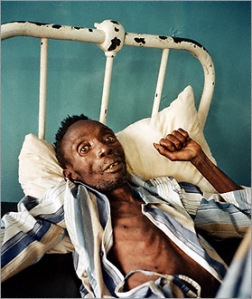Archive
Truth in Paradox – AIDS in Africa

AIDS Patient
The AIDS pandemic in sub-Saharan Africa is said to currently afflict around 22 million people, which is roughly 5% of adults. This value is now lower than was previously quoted, yet it is by no means a sign of an improving situation. There are critics who cite many problems associated with the collection of statistics and their interpretation. Confounding factors such as selection bias (non-random sampling) and elements of corruption on the part of governments in order to obtain foreign aid have been identified. The lower values are probably truer values and show that in the past, the degree to which AIDS has affected Africa has been overstated. It’s still a pandemic. It’s still extremely big, but it means that tracking the progress of AIDS in Africa is proving to be very difficult and gathered information unreliable. It means that any claims to success on the part of the World Health Organization in combating AIDS through the distribution of condoms cannot be easily verified, since we really cannot trust the statistics, especially if the methods of data collection are changing.
It is on this background of unreliable, untrustworthy information on AIDS and HIV prevalence that Pope Benedict XVI and now Cardinal George Pell make claims that, paradoxically, condoms are making matters worse rather than better, through encouraging promiscuity among young adults. Cue the canned laughter from western media outlets.
The thing is, moral arguments aside, they might just be right.
First of all, the research that has been conducted on the efficacy of condom usage in the prevention of sexually transmitted diseases has largely been conducted in the first world, where quality control procedures are excellent, the general health of adults is good and compliance rates are high. Under these circumstances there is no question that the spread of HIV (and other diseases) has been mitigated by the use of condoms. Companies and organizations advocating the use of condoms in the Third World wave their research papers at governments and tell then that the evidence is overwhelming. It sounds plausible and reasonable, all else being equal, but all else is not equal.
The patterns of sexual activity in Africa cannot be assumed to be the same as those in Western countries, yet people in the debate assume this none the less. The situation in Africa is very complex and it is difficult to exclude environmental factors such as changes in demographics, social habits and culture over time. War, extremes of climate, social upheaval, famine and terror inevitably affect things like the reliability of supply routes for condoms and peoples’ sexual behavior. Conducting good quality medical research in such an environment would be very difficult indeed. Results coming from studies in Third World countries cannot be considered to be of high reliability, as the degree of transparency and peer review is not equivalent to that in richer countries. Even some randomized, controlled trials in Western countries (on unrelated areas of medicine) have been shown to be completely fraudulent, making a mockery of the notion of “evidence based medicine” being the infallible guide to medical decision making.
Arguments against the use of condoms in Africa have included claims that the latex used in them is porous and permits the passage of intact virus through the membrane, or poor manufacturing and inadequate storage and transportation conditions resulting in failure of the device, and issues with compliance. These are all plausible, but they do not carry weight against the fact that, in Western countries, they do not seem to have a high failure rate at all and no class actions have been made against manufacturers for a spate of unexpected pregnancies (or HIV infections) due to failure of their product. It sometimes seems that, in this debate, once the Pope makes a pronouncement, the Catholics go out and try to find any conceivable defense of his views (not merely a moral one) to achieve compliance with Catholic teaching among Catholics (and others). They often go out and argue the case without having fully understood the contrary view. As such they have scored many an ‘own goal’ when the arguments backfire.
The AIDS problem in Africa is a behavioral and moral issue, as well as an epidemiological and medical one. Promiscuity, although a thing lauded in the First World in its music videos, movies, magazines and television programs, is the fundamental reason for the spread of sexually transmitted disease. It is the underlying cause. Secondary to this is that coexistent disease, such as malnutrition or pre-existing sexually transmitted infection, magnifies the risk of contracting or disseminating HIV. Condoms attempt to address the secondary problem. They require strict compliance in a subgroup of the population which is probably less compliant than the average.

Western AIDS campaign not addressing promiscuity
Abstinence programs were hailed by fundamentalist Christians as the answer to the teen pregnancy and sexually transmitted disease problem in the USA, but have shown to make no significant difference to either. One reason is that there are much bigger, more effective “education programs” at work there which promote extramarital sexual activity. The media is an incredibly powerful social force in the First World. This is not the case in the poorer areas of Africa where AIDS is most prevalent. The population does not undergo the same sexualization from infancy that occurs in the West. Therefore the failure of education programs in Western countries cannot be used as an argument against a similar effort in Africa. It is not correct to assume that human sexual behavior is unmodifiable. It has certainly been possible to increase the sexual activity and decrease the age of first intercourse in the First World. Why would the opposite effect be unachievable in Africa?
The AIDS problem in Africa has not been solved by Western civilization because its industrialized, technologically advanced and, dare I say it, morally bankrupt culture is not compatible with life in Africa. The imposition of Western solutions on African culture is an obviously flawed idea, yet it is exactly what continues to occur. The rampant spread of HIV in Africa can be largely attributed to the displacement of working men. Foreign industry set itself up in the cities, attracting poverty stricken farming men to find work and food for their families in the cities. Their wives and children remained in the villages. Additionally, major social upheaval in the form of civil wars, the break-down of Apartheid in South Africa and massive population shifts due to famine have resulted in the disruption of the family unit on a massive scale. Many of these disasters were brought about by the direct (albeit covert) actions of Western powers. These events create situations which make promiscuity easy, stress levels high and the likelihood of compliance with any kind of behavioral intervention (including condoms) low.
It is no surprise that the AIDS problem is nowhere near an end in Africa. The “scientific” approach to the solution through medical aid has failed. Perhaps the Catholics were right. Staying with the one sexual partner (one’s spouse) and staying with one’s family costs nothing, requires no technology and makes a society strong. Families exist because they work, because over the eons they have allowed human beings to survive hardships which would otherwise have wiped them out. Encouraging this kind of responsible behavior should be at the forefront of every intervention in the African continent, regardless of who is carrying it out. This means that trends which favor the destruction of the family unit (such as industrialization) need to be curtailed or at the very least changed so that the family unit is guaranteed to remain intact.
The paradox may very well be true, that the exact opposite approach taken in First World to counter HIV/AIDS is the correct one for sub-Saharan Africa.